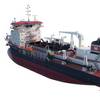Three Engineers Win DNV GL Award for Young Professionals
DNV GL has honoured three engineers for their scientific research with the DNV GL Award for Young Professionals. Presented by DNV GL – Maritime CEO Knut Ørbeck-Nilssen at the Posidonia trade fair, the award is designed to find innovative ideas for increasing safety, efficiency and sustainability in shipping. As well as seeking out the best new research, the award aims to support young professionals in the maritime field. Overall, 24 people took part in the competition.
“Young professionals are a driving force in developing innovative solutions to the challenges shipping faces today and in the future. This award was created to honour the brightest among tomorrow’s industry experts and it is very interesting to learn more about this year’s winning projects,” says Knut Ørbeck-Nilssen, CEO DNV GL – Maritime, who presented the awards to the winners in a ceremony at Posidonia.
The prize in the category “Safer” and 1,000 Euros went to Aleksei Alekseev, a participant in the Erasmus Mundus Masters programme in Advanced Ship Design, which is jointly conducted by the universities of Rostock, Liege and Nantes. Alekseev won the award for his master thesis “Numerical Simulation of Ice Ridge Breaking”, which created a tool capable of simulating the behaviour of vessels operating in ridge ice. The tool could also be expanded to model ships in various other fragmented ice formations. Alekseev employs the discrete element method technique, where a multitude of individual, unconnected ice blocks can be simulated along with the water to derive pile-ups, forces on the vessel and the required thrust. Simulation tools such as the one developed by Alekseev enable technical experts to predict the performance of ships and offshore structures in ice. Such forecasts can play a valuable role in enhancing the safety of arctic operations.
Isa Duran’s paper “Total cost of ownership”, won the award in the category “Smarter” and 1,000 Euros. Duran received his Master’s degree in 2014 from the Danish Technical University (DTU), where he has continued to work as a research assistant. His thesis describes a synthesis software, which can assess an asset’s life-cycle costs at the design stage. In shipping, interest in life-cycle management and life-cycle cost considerations has grown considerably over the past few years. Duran’s work combines a multitude of approaches and software in a coherent life-cycle design tool. It extends ship design approaches to include life-cycle cost estimates, looking at specific routes and weather statistics on these routes. The software combines classical naval architects’ approaches for calm-water power prediction with new modules for in-service fuel consumption, construction and operational costs. Notably the tool is not only a demonstrator for ship operators, but is also intended to be used as a teaching tool at DTU.
The award in the category “Greener” and 1,000 Euros went to Victor Bolbot for his thesis “Optimization of Ship’s Bow for Added Resistance in Waves”. His work demonstrates a key trend in ship design, namely the consideration of realistic operational profiles and realistic ambient conditions. Bolbot combines simple design estimates for calm-water resistance with a semi-empirical approach for the added resistance in waves. He shows that moderate changes in the bow can lead to lower EEDI values. The optimization also favors a straight vertical bow rather than the currently popular bulbous bow designs. This is confirmed by more sophisticated CFD analyses and is also in line with DNV GL’s recent findings from its Green Dolphin project for future bulk carriers. The work combines current software tools with classical naval architectural estimates, to find a good trade-off between time, cost and accuracy. The thesis is a valuable contribution to more energy efficient shipping.
The submissions for next year’s DNV GL Award for Young Professionals can be submitted between 1 January and 31 March 2017. The range of topics includes shipbuilding and design as well as vessel operation and marine technology. The theme is “Safer, Smarter, Greener”. Entries will be judged by their quality, complexity and impact on society. All papers must be written in English and must not be more than three years old. The jury will announce the winners in May 2017.










